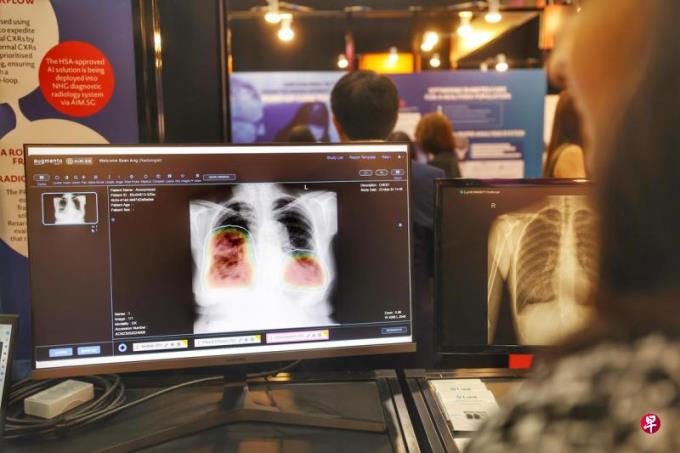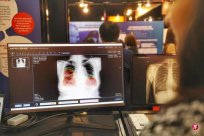
Our basic policy is to ensure that medical care services can be assisted or enhanced by artificial intelligence, but we cannot make decisions by artificial intelligence.But we cannot move towards another extreme, restrain ourselves with regulations and rules, and cannot use various opportunities brought by artificial intelligence.
Throughout human history, the breakthrough of science and technology has always been a double -edged sword.The invention of steam engines and spinning machines has opened the industrial revolution.On the one hand, they accelerate economic growth and stimulate world trade.On the other hand, they have caused oppression of workers and the rise of Marxism and communism.The Internet makes unlimited knowledge be available, but followed by cyber crimes and threats to the mental health of a generation.Medical care is on the edge of historic science and technology breakthroughs.The data owned is unprecedented and can fundamentally change medical care.
I believe that genomics, artificial intelligence, and attention to prevention of nursing -the fusion of these three very powerful scientific and policy strengths will have a profound impact on medical care.
Prevention Factors
I believe that only when we prevent major risks, innovation can exert the greatest potential.There are two major risks in the field of health care.
First of all, it is the destruction of social moral ethics.The core composition of genetic decision.Scientific progress allows people to draw genetic information easily and cheaply, and even manipulate genes.Therefore, we can now edit defective genes to treat diseases.But in theory, the same technology can be used to design it before the baby is born, or select employees and awarded university places according to gene quality.
Insurance companies can also use genetic information to determine the scope of insurance underwriting, weaken the main purpose of insurance, that is, protect us from accidental doom, including the impact of genetic adverse genes.Therefore, the Ministry of Health cooperated with the Singapore Life Insurance Association to formulate a "temporary ban on genetic testing and insurance" to prohibit the use of genetic testing results to determine whether to undertake.In some cases, we need to strengthen this prohibited order and become permanent instructions.The Ministry of Health is formulating new legislation to supervise the use of genes and genome test data.It aims to solve potential adverse consequences, such as using genetic information discriminatoryly in insurance and employment.We will conduct extensive consultations and hope to submit a bill to Congress in the next year or two.
The second main risk is the rise in medical costs.Genomics makes precision medical care possible.This refers to tailoring the appropriate treatment according to the unique genetic characteristics of a person to treat serious diseases such as cancer.However, because this is a tailor -made treatment, precision medical care will be very expensive, and each treatment costs hundreds of thousands of yuan.
In the field of health care, innovation has different meanings from most other industries.For these industries, innovation means better performance or quality at a similar or lower cost.Just look at the performance and price of semiconductor chips, smartphones and cars for decades, we will understand the value and benefits of innovation.However, in the field of health care, innovation usually means to increase the opportunity to cure severe diseases or extend life at a higher cost.This is the double -edged sword of precision medical care.
Over time, precision medicine will gradually become the mainstream of clinical practice.However, there is currently no medical financing system in the world, designed specifically for comprehensive funding for precision medical care.This means that if it is not intervened, it is likely that only the rich can bear it, leading to serious inequality.Therefore, we are taking measures to introduce precision medical care in a sustainable manner and prepare for it on the day when it becomes mainstream.
For example, we are investing in the ability to develop precision medical therapy locally, shorten production time, and reduce costs soon.We have strengthened medical science and technology assessment to strictly evaluate the cost benefits of high -cost therapy such as precision medical care.If these therapies are proven to have clinical and cost -effective, we will give allowances.
The Lifetime Health Insurance Council will issue a report next week.They suggested that the scope of life insurance underwriting will be extended to approved precision medical therapy.The Ministry of Health intends to adopt this suggestion.In this way, approved therapies will be included in the framework, lifelong health insurance and health savings support framework, and all Singaporeans can benefit.The risk of reducing the breakthrough of scientific and technological breakthroughs is often passive, but using related opportunities to change medical care requires active planning.
I will focus on the advantages of breakthrough technology in health care.There are three aspects: 1. Apply artificial intelligence in medical institutions; 2. Develop predictive prevention care; 3. Establish an information technology infrastructure system to achieve these functions.
Artificial Intelligence Enhanced Medical Care
First of all, how do we apply artificial intelligence in hospitals and diagnosis and treatment.Healthcare has an advantage in the use of breakthrough technology because it is an industry that has been strictly regulated.In contrast to this, artificial intelligence has caused great damage to the creative industry. People can create a song in Taylorce's style and sing with her voice.In the field of medical care, due to the improvement of laws and regulations, we can ensure that there are often clinical checkpoints and the judgment of medical professionals will not be replaced.
Therefore, our basic policy is to ensure that medical care services can be assisted or enhanced by artificial intelligence, but we cannot make decisions by artificial intelligence.But we cannot move towards another extreme, restrain ourselves with regulations and rules, and cannot use various opportunities brought by artificial intelligence.We must actively identify the cases of artificial intelligence in medical care, and adjust the rules and regulations to promote its application.
The Ministry of Health will inject about 200 million yuan into the Health Care Innovation Fund in the next five years.This exceeded the government's investment in research and innovation through research, innovation and enterprise plans.If we want to have a strong impact on technology, we need to surpass innovation.It is necessary to promote it by the government.The Ministry of Health will determine the verified and influential technology or use cases and extend it to the national project of the entire system.We will start from two projects.
First of all, we will automate repeated and time -consuming work, such as daily file archiving and consulting medical records.Medical staff must do this for each patient to update their medical history, but this will occupy a lot of time.In addition, many patients believe that doctors are busy using their computers and do not pay attention to them. In fact, doctors are listening and updating the patient's medical records.Artificial intelligence tools can now automatically transcribe and summarize the conversation between medical staff and patients.This information must still be reviewed by professionals before becoming a formal medical record.Therefore, it will not replace humans, but it will improve efficiency.
The Singapore Government Science and Technology Bureau (Govtech) has developed tools named Scribe, which can handle English, Malay, Chinese and even Singapore -style English, and will gradually promote more public medical users.The health care cluster also uses various tools to do this work.The Ministry of Health will coordinate the efforts of public medical institutions to launch an automated record update in the entire public medical system by the end of 2025.If everything goes well, doctors, nurses, comprehensive medical care staff and medical social workers can spend more time interacting with patients.
Secondly, we will use artificial intelligence for imaging to improve the quality of nursing.The hospital uses artificial intelligence for chest X -ray and colonoscopy.We can develop these standards in the entire system.However, it must be noted that the artificial intelligence imaging function is powerful and you can find the smallest abnormalities, but not all the abnormalities seen in the scan are clinical significance.We should not respond to each exception detected, which will only increase the unnecessary anxiety of patients, leading to excessive and invalid care.
We should be responsible for using artificial intelligence imaging technology, only detecting and tracking symbols of clinical significance.thisIn the same way, we can find these signs earlier and deal with it in time before they become serious without causing unnecessary worry and panic.In addition to colonoscopy and chest X -ray examination, we will also evaluate how to use artificial intelligence image analysis in breast X -ray inspection.If it is proved to be valid, starting from the end of 2025, we will start gradually promoting throughout the system and formulate appropriate workflows and nursing channels.There will be many other applications for artificial intelligence imaging.In order to accelerate the deployment, we have established an information technology platform called AIMSG. Public hospitals can use a single platform to adopt different AI imaging models and monitor the performance of the model.
Development predictive prevention care
There is a well -known correlation between the current risk factors and future diseases.For example, if you smoke or suck an electronic cigarette, you are more likely to have many diseases, including cancer and dementia.If you do not exercise and take too much sugar, you can easily develop diabetes.If teenagers lack sleep and spend a lot of time in social media, the risk of depression will be higher.With artificial intelligence, you can have more complicated and variable disease prediction models, including parameters such as health, lifestyle, and socioeconomic status.Increasing genetic information can make such models stronger.
In Singapore, about 60 people with heart disease and stroke every day.With enough data and well -trained models, many people can be warned in advance.We can then open preventive measures, including changing lifestyle or taking drugs.Therefore, we can avoid pain and pain very significantly.This is a major change.We need to treat predictions with caution, otherwise it will cause many unnecessary concerns and panic.
We will start with Familial HyperCholesterolemia (FH).FH is caused by genetic defects, which affects the body's way of cholesterol.People with this disease are more likely to have a very high level of cholesterol.The possibility of heart disease is 20 times that of normal people, and the risk of heart disease occurred when they were young.It is also hereditary, which means that it can be inherited in the family.
Through genetic testing, we can directly determine whether someone has FH.The relationship between genetic mutations and abnormal high cholesterol levels has been fully confirmed for FH.We will not use artificial intelligence for this case, but the principles they are based on are similar.In the past year, the Ministry of Health has cooperated with the Singapore Institute of Precision and Health (Precise) and hospitals to design appropriate predictive prevention care methods for FH.
Family doctors and comprehensive diagnosis and treatment plans participating in the health SG plan will help identify patients with abnormal cholesterol levels, and suggest that they receive FH defect gene testing.Tests will receive allowances, and the remaining expenses can be paid using health savings.If the FH test is positive, it will encourage their parents, siblings, and children to receive the same test.This is called the class screening.By repeating this process, we can find people with genetic diseases as soon as possible.We will suggest that they develop a healthier lifestyle as soon as possible and start to lower cholesterol treatment when necessary to reduce their risk of early heart disease.
We have made statistics in order to abide by financial discipline.In essence, we spend more in gene screening and support prevention nursing, but can reduce the cost of follow -up heart disease.In 30 years, we will spend about 14,000 yuan to avoid a heart attack, which is considered cost -effective.However, over time, as the cost of genetic testing continues to decline, we can better identify the affected individuals. We only need to test once to prevent some diseases with results.
We will implement FH use cases from the middle of next year, including establishing a genome assessment center.If it succeeds, we will launch genetic testing for breast cancer, colon cancer, diabetes, renal failure, stroke, and heart disease.This requires a complicated and variable artificial intelligence model.
If we do not invest in genomics research for many years and establish a health SG system to provide a policy implementation platform, we will not be able to achieve this.Behind the scenes, we use artificial intelligence's magic and predictive ability.At the front end, it has a friendly service for patients through a health SG program and a family doctor.If the patient is likely to suffer from specific serious diseases, the back -end system will remind family doctors.Doctors will be able to take necessary medical measures and provide consultation and suggestions for patients to avoid severe diseases in the future.With the help of new technology, we enable family doctors to provide better care and allow individuals to better take care of our health.
Establish information technology infrastructure
As we use a large amount of data to improve medical care services and prevent serious diseases, there will be unavoidable concerns about data security and privacy.In 2018, serious health data leaks occurred.Since then, we have thoroughly reviewed information technology systems and programs and invested a lot of funds in network security.For security reasons, I cannot explain in detail what we have done, but I will list two measures.
First of all, we store medical data in a dedicated cloud managed by the Government Science and Technology Bureau and Synapxe, allowing us to fully control the data.Secondly, our office equipment has not been fully connected to the Internet.Medical staff use virtual browsers to browse the white list Internet website.This is one of the simplest and most effective online security measures.As for the protection of data privacy, the government developed Trust data exchange two years ago.This is a national platform that can be shared for research.
Through Trust, according to government anonymous standards, the identity and identification of patients will be deleted from various data sets.Researchers must submit detailed applications to use data for research; if they are approved, the data applied will be summarized in a safe Trust environment for analysis.Researchers cannot download any data. After the analysis is completed, the data will be deleted.
In the next few years, we will further develop information technology systems to promote innovation and ensure that online security and data privacy.The first major development is an electronic medical record system that integrates the public medical system.Among the three medical clusters, two have been using the same electronic medical record system.The last cluster will be added a few years later.At that time, Singapore may become the only country for the entire public medical system to use the same electronic medical record system.This will improve the quality of the data collected throughout the patient's entire treatment, and provide a better basis for doctors to make decisions in different institutions and environments.At the same time, the generated artificial intelligence tools will be integrated into the electronic medical record system for use, becoming a part of the clinical and workflow.
Secondly, we will develop information technology platforms to train and develop artificial intelligence tools.Strictly speaking, artificial intelligence functions are not developed or constructed.Instead, they appear after training and using real data.Through a new platform called Healix, with the help of high -level learning and intelligent exchange to empower health management, it will realize the latest, consistent and anonymous clinical, socioeconomic, lifestyle, medical care operations and genome data.Using these data, Healix will train various artificial intelligence and machine learning tools, including predictive prevention care.Healix will become an artificial intelligence technology factory for the healthcare system.
I hope I have developed an ambitious plan that commensurate with the era of science and technology we live.This is the result of many experts and institutions over the years.From EMR and Trust to Health SG and Healix, we are built step by step, and now we have future strategic plans.Singapore is fast aging, and the status quo is unsustainable.I hope that this spirit of innovation and pursuit of progress will continue to develop in the field of health care and spread to every business in Singapore.
The author is the Minister of Health. This article is his newSpeech of the Slope Health and Biomedical Conference
Golden Shun Festival translation




